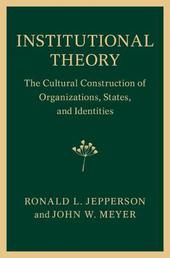
|
Institutional Theory: The Cultural Construction of Organizations, States, and Identities
Paperback / softback
Main Details
| Title |
Institutional Theory: The Cultural Construction of Organizations, States, and Identities
|
| Authors and Contributors |
By (author) Ronald L. Jepperson
|
|
By (author) John W. Meyer
|
| Physical Properties |
| Format:Paperback / softback | | Pages:280 | | Dimensions(mm): Height 230,Width 150 |
|
| ISBN/Barcode |
9781107435285
|
| Classifications | Dewey:302.35 |
|---|
| Audience | | Professional & Vocational | |
|---|
|
Publishing Details |
| Publisher |
Cambridge University Press
|
| Imprint |
Cambridge University Press
|
| Publication Date |
1 April 2021 |
| Publication Country |
United Kingdom
|
Description
Over the past three decades, Meyer, Jepperson, and colleagues have contributed to the development of one of the leading approaches in social theory, by analyzing the cultural frameworks that have shaped modern organizations, states, and identities. Bringing together key articles and new reflections, this volume collects the essential theoretical ideas of 'sociological neoinstitutionalism.' It clarifies the core ideas and situates them within social theory writ large. Among other topics, the authors discuss the changing nature of the "actors" that have operated within contemporary social structure. The book concludes with the evolving frameworks that have structured social activity in the post-World War II period of 'embedded liberalism,' in the more recent neoliberal period, and in an emergent post-liberal period that appears to be a radical departure.
Author Biography
Ronald L. Jepperson is Associate Professor of Sociology, emeritus, at the University of Tulsa, where he taught social science, philosophy, and critical thinking to undergraduates. Previously he was a faculty member at the University of Washington, and a visiting professor at Stanford University, the University of California-Berkeley, and the European University Institute. John W. Meyer is Professor of Sociology, emeritus, at Stanford University. His research has focused on comparative sociology, education, and formal organizations, employing and developing neo-institutional theory, emphasizing the dependence of modern social structure on wider and often global cultural frameworks. He has published widely and received many academic honors.
Reviews'Despite its influence, neoinstitutional theory has long been known by its parts, with organizational theorists focusing one strand and political sociologists on another. Institutional Theory, a collection of foundational and in some case little known essays and new reflective chapters by the theory's progenitor, John Meyer, and one of its most gifted expositors, Ron Jepperson, is the first volume to present institutional theory as a single coherent approach to social analysis, with compelling results. Because most work in institutional theory has been published in conventional journal-article format, using unpretentious language and familiar comfortably positivist methods, it has been easy to underestimate the extent to which it represents a fundamentally radical break with received theory, challenging and reworking such basic categories as action and agency, levels of analysis, and organization in ways that will defamiliarize and reconstitute the reader's understanding of the social world. This welcome volume will be a critically important resource for social theory for many years to come.' Paul DiMaggio, Professor of Sociology, New York University 'Starting as a movement against mainstream realistic views of actorhood, neoinstitutional theory has established itself as sociology's core paradigm which tells us what makes it distinct in the family of the social and economic sciences. This collection of milestone essays demonstrates this achievement in all its depth and ramifications.' Richard Munch, Senior Professor for Theory of Society and Comparative Macrosociology, Zeppelin University 'We have waited decades for a book long treatment of new institutional theory to be published. Simply put, the Jepperson-Meyer statement is a gem that was worth the wait. It presents many of the most important statements of the theory, a summary of the theory's substantial research program, and renewed theoretical analysis with a proposal for a reinvigorated empirical project.' Neil Fligstein, Class of 1939 Chancellor's Professor, University of California, Berkeley 'Jepperson and Meyer expound the hugely influential institutional approach to understanding the individual, the corporation, and nation-state as cultural projects. These institutions arose by historical happenstance to become part of a global project that has culturally aligned societies around the world. The theory is not so much an alternative to prevailing theories of politics, structures, power, and self-interest as a corrective to all contemporary theorizing. This sophisticated, witty, volume theorizes not only where modern global society came from but, importantly, where it is going.' Frank Dobbin, Henry Ford II Professor of the Social Sciences, Harvard University 'While modern common sense takes actors for granted, social theory must also look inside and beyond the black box of actorhood. In this important book, Jepperson and Meyer show how modern individuals, organizations and states are constructed from cultural models. They delineate and carefully elaborate a compelling theoretical account that spans multiple levels of analysis and provides illuminating insights into contemporary world society and its cultural-institutional framework.' Boris Holzer, Professor of General Sociology and Macrosociology, University of Konstanz
|